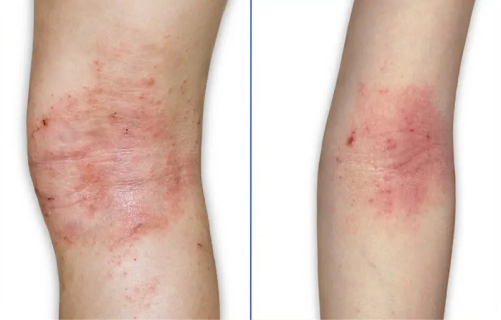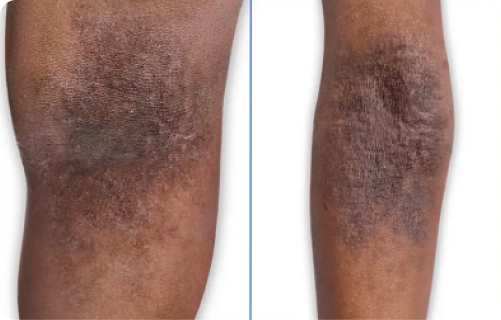Signs and symptoms of moderate-to-severe eczema may include:
- Intense itching
- Inflamed skin that looks red or discolored, depending on skin tone
- Bumpy skin
- Oozing skin
- Thickening of the skin
- Scaly skin
Eczema may look different depending on skin tone.
Photos enhanced to illustrate moderate-to-severe eczema.
Eczema is a widespread condition
If you’ve experienced the effects of eczema, you know how much of a burden it can be—and you’re not alone. In the U.S., about 8.7 million people (12 and older) have moderate-to-severe eczema. For many of those people, managing symptoms can be a real struggle.
Expect more from your eczema treatment. Talk to a doctor and learn more about your options.

What causes eczema?
Eczema may be caused by various factors, such as genes or triggers in your environment.
But your immune system may also play a role, as seen in the process below:

IRREGULAR IMMUNE RESPONSE
Eczema can be caused in part by an irregular immune response within the skin.

INFLAMMATION
This immune response is thought to contribute to inflammation in the skin.

SIGNS OF ECZEMA
Inflammation contributes to the signs of eczema you see on the skin’s surface.
Stay informed
The more you know about eczema, the more prepared you can be to have meaningful conversations about your treatment options.
Talk to a doctor and see if CIBINQO is right for your or your teen’s moderate-to-severe eczema.
Get our full guide for talking with your doctor
We’ll help you track symptoms, consider your goals, and note questions to ask—whether your conversation is virtual or in person.
Download the full discussion guide
Send the guide to your inbox
https://cibinqocom-main-page.web.pfizer/global/fragments/email-ms




